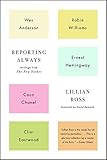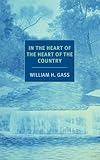When I was asked to contribute to A Year in Reading, the first, familiar thought that popped into my head was that I don’t read very much. I say this to people all the time. They never believe me and they shouldn’t, really. We’re all reading—and writing—obsessively these days, but often not in forms that we readily allow ourselves to take pride in.
A few years ago, one of the publications I’ve written for brought “Infinite Scroll” to their website—you read one article and a new piece comes up as you reach the bottom. I’ve long thought the phrase captures the experience of reading and being on the Internet as a whole perfectly—we’re all floating along a never-ending stream of content, a reality that might have been fun to imagine 20 years ago but feels bleaker each passing day of this political era.
When I’m offline, I find myself reading less for pleasure than for understanding—try as I might, I can’t stop trying to figure out just what the hell is going on. I’ve been getting more and more helpful books sent to me recently. One I can recommend for those actively watching protesters staring down riot cops in Hong Kong and Latin America is Badges Without Borders, a look at the international circuit of policing strategies by Johns Hopkins’s Stuart Schrader. Another is Stolen, an impressively accessible history of financialization in Britain that puts the changes we’ve seen within our own economy over the past several decades in to a broader context.

Those who believe, as I do, that we won’t know where we’re going in this country without revisiting where we’ve been should check out Alan Taylor’s American Colonies. It’s a thorough history of the early settlement of this continent and is, as such, a horror story — one that makes the cruelties and absurdities of the current moment seem less improbable than inevitable. Raymond Williams’ beloved book of etymologies Keywords, which I finally picked up this summer, might make them a little more intelligible.



There are several essay collections I tend to graze through in rotation—H.L. Mencken’s Prejudices is a constant, as is Didion’s Political Fictions. The closest I get to escapism in nonfiction is in my reading of old profiles. I’ve been reading Lillian Ross’s compilation Reporting Always on and off for a while now and it’s often transportive. New York in the 1950s—the world of legendary jeweler Harry Winston, profiled in Ross’s “The Big Stone,” and a way station for an increasingly eccentric Hemingway, profiled in “How Do You Like it Now Gentlemen?”—might as well have been a different planet.
Those were the kinds of pieces I went for after reading David Wallace-Wells’s The Uninhabitable Earth, an absolutely monumental book I’ve been pushing on friends all year. There’s a lively debate happening now over the literature of climate peril and whether pretty fatalism serves readers looking for answers as much as it does the egos of a growing cadre of mostly white and mostly male climate writers. In this particular book, Wallace-Wells foregrounds the facts about where we’re headed without much navel-gazing and leaves room at the end for musings about how the climate crisis might reshape the stories we tell about ourselves as thoroughly as it does our environment:
[A]s climate change expands across the horizon—as it begins to seem inescapable, total—it may cease to be a story and become, instead, an all-encompassing setting. No longer a narrative, it would recede into what literary theorists call metanarrative, succeeding those—like religious truth or faith in progress—that have governed the culture of earlier eras. This would be a world in which there isn’t much appetite anymore for epic dramas about oil and greed, but where even romantic comedies would be staged under the sign of warming, as surely as screwball comedies were extruded by the anxieties of the Great Depression.
 The big novel I read this year, Don Delillo’s Underworld, was extruded by the anxieties that followed the end of the Cold War and linger today. More than 20 years after its publication, we remain, like its characters, adrift at what was supposed to have been the end of history. What we’ve actually reached, as the artist Klara Sax says early on in the novel, is the end of the old world order:
The big novel I read this year, Don Delillo’s Underworld, was extruded by the anxieties that followed the end of the Cold War and linger today. More than 20 years after its publication, we remain, like its characters, adrift at what was supposed to have been the end of history. What we’ve actually reached, as the artist Klara Sax says early on in the novel, is the end of the old world order:
Many things that were anchored to the balance of power and the balance of terror seem to be undone, unstuck. Things have no limits now. Money has no limits. I don’t understand money anymore. Money is undone. Violence is undone, violence is easier now, it’s uprooted, out of control, it has no measure anymore, it has no level of values.

Underworld is a novel about the ground beneath our feet—the systems and technologies and histories that link us and the cosmic sense they all make even as it becomes harder and harder to understand what’s happening before our eyes. The project of helping others understand through journalism feels harder still. But every good bit of prose, no matter where it comes from or what it’s about, steadies my faith in the power of writing. I’m particularly glad to have read William Gass’s In the Heart of the Heart of the Country, a short story that finds a narrator living through loss in a “small town fastened to a field in Indiana.” His musings about the midwest and its people are interrupted, near the end, with a memory from his childhood—picking apples against a swarm of hungry flies:
There were streams of flies; there were lakes and cataracts and rivers of flies, seas and oceans. The hum was heavier, higher, than the hum of the bees when they came to the blooms in the spring, though the bees were there, among the flies, ignoring me—ignoring everyone. As my work went on and juice covered my hands and arms, they would form a sleeve, black and moving, like knotty wool. No caress could have been more indifferently complete. Still I rose fearfully, ramming my head in the branches, apples bumping against me before falling, bursting with bugs. I’d snap my hand sharply but the flies would cling to the sweet. I could toss a whole cluster into a basket from several feet. As the pear or apple lit, they would explosively rise, like monads for a moment, windowless, certainly, with respect to one another, sugar their harmony. I had to admit, though, despite my distaste, that my arm had never been more alive, oftener or more gently kissed.
Maybe nothing is truly ineffable.
More from A Year in Reading 2019 Do you love Year in Reading and the amazing books and arts content that The Millions produces year round? We are asking readers for support to ensure that The Millions can stay vibrant for years to come. Please click here to learn about several simple ways you can support The Millions now.
Don’t miss: A Year in Reading 2018, 2017, 2016, 2015, 2014, 2013, 2012, 2011, 2010, 2009, 2008, 2007, 2006, 2005
The post A Year in Reading: Osita Nwanevu appeared first on The Millions.
Source : A Year in Reading: Osita Nwanevu














